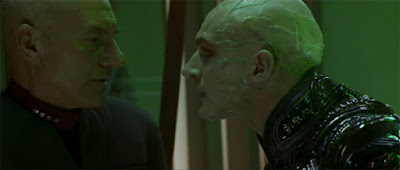I tend to think of Star Trek: Nemesis (2002, directed by Stuart Baird) as the last of the Star Trek movies. Oh, I know there's the re-boot, but I'd prefer to ignore it, truth be told. As with Star Trek: Insurrection, I remember hating Nemesis on its original release. I thought at the time--and still do, actually--that it was trying a bit too hard to be The Wrath of Khan. In retrospect, it's not a bad sci-fi action film if that's all you're interested in. I'll get to that in a bit. What I DIDN'T remember, maybe because I wasn't as sensitive to such things at the time, was how appallingly sexist it is.

The story here finds the Romulan Empire in a state of transition. In the opening of the movie, the entire Senate is assassinated by agents working for the shadowy Reman overlord, Shinzon. The Romulans had used Remans as a slave and warrior caste, and their rise to power, backed by the military, is a surprise. The Enterprise, for its part, is basking in the recent wedding of Commander Riker--soon to be assigned his own ship as a full captain--and Councilor Troi. On their trip through the quadrant, they're diverted near the neutral zone by a faint positronic emanation from the remains of an android. The android, it appears, is a less sophisticated prototype for Commander Data named B-4. While they contemplate how he came to be found where he was, orders are received from Star Fleet directing them to Romulus on a diplomatic mission. They find in Shinzon a clone of Picard, raised as a discontinued plot against the Federation and abandoned to the mines of Remus, where he rose to power. Shinzon has a sinister plan for both Picard and the Federation, involving a ship designed to use Thalaron radiation in apocalyptic ways. Picard, for his part, represents a means to overcome the flaw in his design that is about to kill him...

A lot of Nemesis seems designed specifically to provide actions sequences. The trip to the planet where the remains of B-4 are found gives the movie something that was previously "lacking" in Star Trek: a car chase. The way this is filmed seems deliberately to echo Mad Max. It seems out of place in Star Trek. It seems wholly gratuitous, designed to give the audience a climax at the reel change, methinks. A lot of Nemesis is designed that way. The sequences--Hollywood style--are in ten minute intervals. The end of the movie is an elaborate space battle in which the Enterprise is fighting a foe with a personal, deeply felt enmity for Picard, a la Khan, and climaxes with Data sacrificing himself for the greater good, as Spock does at the end of Khan (leaving itself virtually the same "out" for future installments, to boot). The battle itself isn't bad, actually. Once the movie mixes in a pair of Romulan warbirds on the side of the Enterprise, you can actually see the movie choreograph the space ships as if there are actual tactics at work, even if it does devolve to "ramming speed!" at the end. In spite of this, the film still hinges on a fistfight, causing me to roll my eyes as I do during the other Star Trek films that also end this way.

The focus of the Star Trek movies is usually on a triad of characters. In the Next Gen movies, that triad has usually been Picard, Worf, and Data. In Nemesis, that formula is changed, with Troi stepping into the trio, and Worf retired to the sidelines. This doesn't bother me, in theory. One wishes that it hadn't been the tenth movie in the sequence to stumble upon this kind of interchangeability, because it provides some welcome variability. Nemesis gives all three of its focus characters secret sharers. Picard, obviously, has Shinzon, his clone. Data has B-4, his "brother." And Troi has the Reman Viceroy, Shinzon's telepathic right hand. The narratives surrounding both Picard and Data take as their theme the nature versus nurture debate. At the basic level of their physical being, they are identical to to their twins, but neither of their twins has shared their lives. The movie has a facile opinion of all of this. Nurture is categorically more important. Data articulates this in fairly unambiguous manner:

"Data: The B-4 is physically identical to me, although his neural pathways are not as advanced. But even if they were, he would not be me.
Picard: How can you be sure?
Data: I aspire, sir, to be better than I am. B-4 does not. Nor does Shinzon.
This would be an interesting dialectic if the movie really cared about it, but it only gives it lip service. There's not enough dark-night-of-the-soul for either Picard or Data. They don't see enough of themselves in Shinzon or B-4 for this theme to really play out, and the movie is particularly Manichean in its dichotomy between its mirror images. The Remans are visually very similar to the Borg--Bob Ringwood's goth bondage freak aesthetic is in full flower in the costume design of both races--and the movie even name-checks them, but there's never the existential threat that the Borg provided. There's never a threat to Picard's basic humanity here. If anything, he's too much a paragon of virtue in this movie, moreso than in the previous films. Paragons of virtue are boring. I suppose you could make a case for Shinzon measuring himself against such a paragon and coming up short, but that never seems to be the point of the movie.
And then there's Troi's story arc...hoo boy!

But first, I also want to talk a little bit about the Romulan commander, Donatra (played in the movie by geek favorite Dina Meyer). Both Troi and Donatra have story arcs that show a particular cluelessness on the part of the entirely male writing staff. When we're introduced to her, she tries to seduce Shinzon, suggesting that her position has been "earned" by means other than her competence. This colors her betrayal of Shinzon at the end of the movie not as a principled action to avert genocide--as it SHOULD be and as it's clearly intended to be--but as, instead, the act of a jilted lover whose actions are governed by her sexuality.
Bad as this is, it's small beer compared to Troi's arc. The Enterprise is able to find Shinzon's starship, the Scimitar, through a psychic link between Troi and the Reman Viceroy. For the mechanics of the plot to work, the movie has to manufacture a connection between the two. Therefore, the movie gives Shinzon an...attraction to Troi. He's never met a human woman and using his Viceroy's telepathic intervention, he invades Troi's mind as she's having sex with Riker. This is filmed like a rape scene...no, strike that, it IS a rape scene. Hell, the movie even acknowledges this when Troi describes the "violation." This is bad enough, but in the subsequent scene, Picard asks Troi to endure more of the same kind of violation for tactical advantage, to endure being raped for advantage. Let me repeat that: A Star Fleet commander asks a subordinate to invite subsequent rapes for tactical advantage. For a paragon of virtue, this seems completely, well, completely evil. Maybe that's the point. Maybe it's Picard's dark side manifesting from his own mouth, but I doubt it. The movie is so off-handed about it, and so unable to look inward at what it's doing that it seems wholly unlikely. It just doesn't think that hard about it.

Mind you, making contact with Troi does NOTHING to further Shinzon's evil plot. It exists SOLELY as a convenient plot mechanic so the Enterprise can find the cloaked Scimitar, which makes this plot thread even more reprehensible. But the movie doesn't stop there, because later in the movie, it places Shinzon's Viceroy in a boarding party tasked with retrieving Picard from the Enterprise. As a practical matter, the boarding party never has any chance to accomplish its mission. It's as if the movie has set things up, instead, to place Riker in a position to commit what is essentially an honor killing. It's seriously weird and seriously disappointing, given the series' lofty ideals, seeing a Star Trek movie devolve into a rape-revenge exploitation movie, and one that reinforces the hegemony of the dominant, alpha male, even in a supposedly egalitarian utopia. Well, fuck all that.
And so my trip through the Star Trek movies comes to an end. It's a sour epilogue. The series really deserved a better coda. The original crew had theirs in The Undiscovered Country. The Next Gen crew had no such grace note at the end. Alas.
















1 comment:
This was a dredful film. I expected so much better from this and other Star Trek films..but they are flat.
Imagination runs short when you have hi-paid writers who do not really know the product , the fans or the overly used sci-fi themes.
Mostly they never give us what we want.
The Krell Lab would provide them with a brain boost.
Eventually they will make a mess of a Forbidden Planet Redo.
The original was a classic that should be left alone.
But mindless remakers will spend anyones money when they bend the Banks ears and promise big profits.
The brainless, imagineless film makes should buy some 1950 sci-fi digests and paperbacks and learn from them. Even todays artisit can help them..Like Joe Jusko and Vincent De Fate.
Thanks
Post a Comment